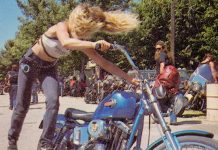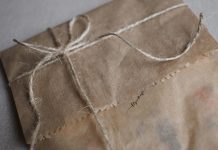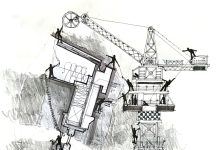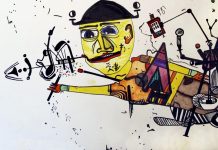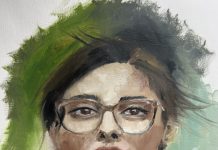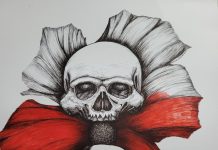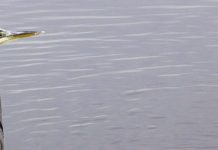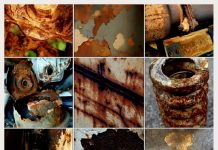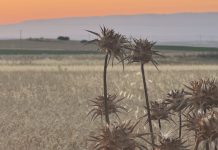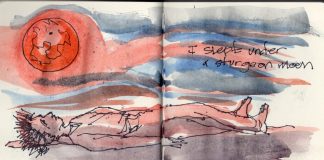I’m spying on Annie B. and Baby Ray Carter gassing up their bikes in front of Eldredge’s country store, watching them squat half-naked in unlaced, Bean hunting boots, rocked back on their heels, hooting with laughter.
They don’t notice me. Together they make a complete world, I don’t matter to them now. They have plans.
In retrospect I see I was always watching them, how they lounged in their bodies like comfortable rooms, not decorative objects to be gawked at. I’ve never known women like them who don’t exist for the gaze, desire, the pleasure of others, of men.
No pursing of lips, applying lipstick or makeup, as if their faces are complete in themselves.
In my mind’s eye, I watch them the women not gazing like Narcissus in the pool in love with their own reflections, not comparing themselves to magazine pictures of impossibly gorgeous, airbrushed models, only turning away to pinch their fat, imagine a different mouth, a smaller nose, different skin, a smaller behind, a different self.
I doubt they think of self at all at least the way I do as a constant humming prayer to be beautiful, perfect, unself-conscious, powerful like them.
In my family, life just happened to you, like dominoes falling on you from out of the sky. You could put your hands up in front of you, try fending them off but you would be plowed under, knocked out. That was fate.
The pogroms, the shtetls, Cossacks, the camps, we were the people of the holocaust, the book. All we could hope for was taking the insults and insinuations with resignation and some requisite grace. There were no female action figures to emulate in my world.
Back to the Carter sisters, gas nozzles cocked like guns in their calloused hands, grease beneath their fingernails, still roaring with raucous laughter, their goose-pimpled behinds grazed the back of their boots, all four chubby, muscular butt cheeks encased in leopard print bikinis like Tarzan’s loincloth, though wild as his character pretended to be, the Carter women were REAL wild-asses, real bad-ass girls.
Spit flew out of their mouths, open so wide you could see the rows of white teeth all the way to the fillings in their back molars. The world was a joke to them, a peach to bite out whatever you wanted. Was that what it meant to live off inherited money, it made you fearless?
Baby Ray could wrestle a heifer to the ground, swing a hammer, build a wall. Her older sister Annie herded goats and Juniper the cow out of the Public Records room singlehandedly after they’d wandered drunk and bloated on swamp water and purple loosestrife up the lane into the Yarmouthport Town Hall and licked the glass cases clean with their blue tongues. That was before female heroes were a thing, at least none I could name.
The two of them were like Butch Cassidy and Sundance, legendary characters only in their early twenties yet already the stuff of stories to me.
Late October, leaves skittered across the pavement in gusts of color swirling before the snow. I can still taste the smoky, chilly scent of burning leaves mixed with melancholy and hope as if it was a harbinger of my life to come.
The sisters leopard print underpants were notable because they were motoring up route 6 A in them, from Yarmouthport to the highway, cruising on unlicensed dirt bikes all the way up to the antique pile of sticks that belonged to some infamous married Boston neurosurgeon one of them was bonking, where they overwintered their Nubian goats and drank liquored up cider by the fireplace in the rocky Vermont hills.
Provisioning and gassing up at Eldredge’s quaint, rural mini mart wasn’t unusual, everyone in the white bread Cape Cod towns shopped there, the only place for miles around.
They’d dragged their bikes out of the barn before the sun rose, greased them up, rolled them through the shaded lane where the last aged elms rained their yellow splined leaves in spirals of tumbling gold. Those beautiful trees were impervious to everything but sap, sun, and rain, and in my mind’s eye they still stand framing the action like chapter markers in an antique book.
Now the sisters were packing up their bikes in front of the twin gas pumps belonging to Babe Eldredge, cramming the leather panniers with apples and Stilton cheese, gold wrapped bars of dark, bitter chocolate and nips of blended whiskey, plus the bottle of Courvoisier I’d bought to impress them with my precocious sophistication.
I watch them dump handfuls of crisp new bills on the counter behind which ancient Ralph Eldredge presided cranking out his toast dry platitudes, winking every second or two as if he had flies in his eyes.
Eldredge’s musty shelves and wet graham cracker odor added to its air of ancientness as if it had always been there, with its antique dust and its shop bell attached to the crappy aluminum door frame jangling and wheezing every time a customer went out or in.
The place was crammed with Dundee Marmalade and homemade jams concocted from beach rose hips, lavender and may-apples gathered from rampant, wild vegetation edging every verdant corner of the Cape in summer. There were pickled onions, twelve kinds of gin, Pepperidge Farm cookies and numerous British sounding brands of chutney. Every kind of mustard and condiment you could desire but hardly any actual food to put them on.
As if those stringy bluebloods’ subsisted solely on gin and tonics and an occasional pickled onion.
Wasp anthropology 1. abstemiousness mixed with voluptuousness was a heady mixture from a world I didn’t come from and had been ambivalently drawn into in ways I still don’t understand.
The moneyed, White Anglo Saxon world of the Cape dazzled and frightened me in its sozzled politesse. Steely, tight-lipped politeness posing as propriety: the mores of a puritan culture all about covering things up, where girls brought up to be the epitome of Amelia Earhart and Katharine Hepburn’s movie heroines could fight against anything.
Whatever threatened to lock them in later on, whatever was amiss in our girl world, we may have felt it but had no way of understanding what shadowed us at the time.
You look back on your life and remember things that stood out because they made no sense to you, but of course you didn’t register them because you were busy living those questions every second of your youth.
Now those memories leap out at me like pieces from a jigsaw puzzle that never fit together. Five decades later I finally recognize the whackness of my girlhood and wonder why we young women never questioned the ridiculous strictures we lived under then.
I had a boyfriend, a twenty year old man really. I don’t know what he saw in me a thirteen year old ugly duckling, awkward with fidgeting hands I tried to contain in too few pockets girls’ clothing had then as if women shouldn’t need to carry things, or wrapped around a chest that kept growing soft, useless bumps, despite my desperate prayers for them to stop.
Gapped toothed, chicken legged; chubby on top with ugly knees that didn’t match each other, then thin and bony on the bottom. When I looked in the mirror I wailed at the unfairness with which perfect beauty was bestowed upon some, while others were decreed unfortunate noses, funnel ears and unattractive facial expressions they couldn’t control.
Beauty was the most important thing a girl could embody, the ONLY thing we were valued for in the generation on the cusp of Women’s Lib. and I wanted the earth to swallow me up for my personal failure in that arena.
What does this have to do with the 1938 Indian Chief motorcycle my beautiful boyfriend was restoring then, a machine I looked at every day and never questioned him about. It was one of many he collected: a Norton something or other, a Vincent Lightning, a Ducati Diana, a Moto Guzi, a Benelli; exotically named bikes that resonated in my incurious mind as beauty, elegance, class, money, and something else I could barely recognize, so couldn’t name.
I piloted them into the swampy woodland behind his family’s summer house on a sunny lane in Yarmouthport replete with emerald, green lawn parties, croquet set up under the portico-shaded sun, and perfect white painted houses with dark green shutters shading their eyes against the less civilized world beyond the Cape.
The few times I rode those bikes, I screamed in reckless peril, flying over hills barely landing upright and at my body’s unfamiliar strength. I’m not sure I understood then what I liked most about boys was what I wanted to be myself, an adventurer I hadn’t located yet, couldn’t even imagine, the wild fearlessness of the boy heroes books and movies celebrated.
Whooping it up on dirt bikes and tractors, quaking with fear, then laughter, falling and jumping back on again, much more than the opposite of sitting with legs politely locked together, waiting by the phone for some pimply boy whose voice had just broken, who could barely speak over the crackling wires to both our burgeoning fear, and my brooding disappointment.
We ‘re about to cruise away from Eldredge’s. The sisters jump on their bikes, flex their thigh muscles, throw back their heads shaking their long bright hair in the sun, howling at some private joke between them, helmets buckled to the handlebars.
They straighten their backs, gun their engines, give us the high-five as we wave goodbye from the cab of Tim’s red stake truck and I wish I could leap out of that truck and ride with them.
But Tim Carter was a kind and handsome man, well-muscled and bronzed, compact and wiry like his sisters. Blue eyed as a summer sky with a smile that made girls swoon and throw themselves shamelessly in his path.
And handsomeness was a big deal when you were thirteen, bigger than anything else I knew about yet.
But half a century later I realize the significant thing for me then and now has always been his swashbuckling sisters.
Like buccaneers on motorcycles, the Carter sisters were the inspiration I’ve yet to live up to. Slow as a tortoise moving towards my targets I sink too easily into the plush upholstery of another soft, somnolent summer evening, sucked into the TV’s vortex of blue light, supine in my sixties, settling like jello.
Growing squat as a fireplug, my legs seem to shrink even more threatening to become useless as knobs. Giving in to geezer-hood, soon I may be incapable of leaping off the couch. One day replaces another, and twilight comes too soon, earlier each day.
Then I remember the Carter barn, perpetually open to the elements. Swallows soared through and roosted in the eaves, an occasional deer wandered in to join the yearling calf Juniper snuffling hay from the stall door pockets, breathing the sweet smell of timothy hay, sweeter for the early frost and that burning scent in the air.
So I jump in the car, drive down cape in a trance three hours past midnight til I find the place. Fifty years later and it’s still there, shimmering in the night like a mirage.
I park on the shoulder of the road and steal silently in until I can almost make out the shadowy edges of the place, creep into the barn feeling my way along the walls, dusting up against years of accretion, farm paraphernalia, shovels and pitchforks, discarded bed frames and broken chairs, and I find it in amongst the old sleds and tennis rackets, the croquet mallets and the Wiffle Ball net.
Under my flashlights halo I spy its maroon ducktail fenders not rusted out the way I remember them from decades ago, but striped with the thin, white hand-painted line I’d watched Tim ease so carefully around that vintage curve, and the headdress of white feathers tipped with red and gold, spread majestically across the gas tank, and suddenly I’m young again, younger than I have ever been.
I roll the bike out beneath the stars still wondrously thick in the country without city lights to obscure them.
We trundle over the gravel breathing in the night air. Then into the dirt lane, and as far away from the house as I can get before I realize I can’t see the brake pedal, can’t remember how to start the motor. There can’t possibly be gas in the tank, and the engine must be gunked up, rusted out or both.
But I swing my leg over the seat, reach down and feel for the gas valve, open it, twist the throttle a few times, open the choke, then turn the key which unbelievably is still in the ignition, jump on the kick starter, then again, and again, and after a couple more tries she goes.
Miraculously she goes, and I remember everything: the first stirrings of desire, the thrill of romance, what romance really means: the stories of our first venturing out into the great world.
I fly down route 6A, wind blowing the night towards me, uncertain which side of the road I’m on. It’s pitch black. I’m alone on a stretch of rural highway from my earliest beginnings flying like Evil Knievil.
Flying down that road like the young boy still inside me, because I didn’t have the experience then, the words for wild, for speed, for joy…………………….
